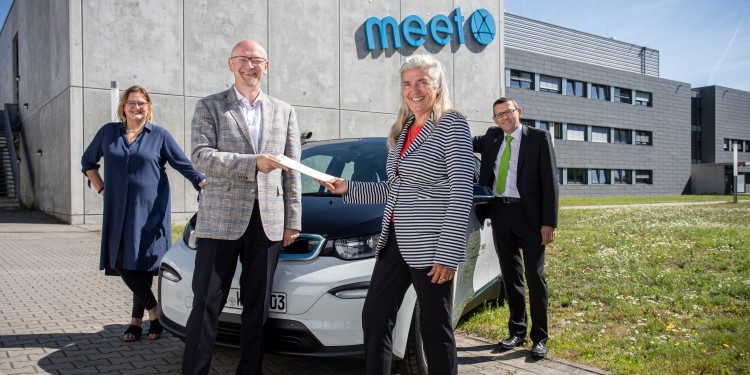
Battery Research Centre: new international research school opened
Longer ranges for electric vehicles and the effective storage of electricity from renewable energies – these are research topics for the future which PhD students in Münster will be working on in a new international Graduate School. The research centre for “Battery Chemistry, Characterization, Analysis, Recycling and Application” (BACCARA for short) was officially opened on August 5 at the MEET Battery Research Centre at the University of Münster. It was set up with the participation of Münster University’s Department of Chemistry and Pharmacy and the Helmholtz Institute Münster – an outstation of the Jülich Research Centre. The state of North Rhine-Westphalia (NRW) is providing 9.5 million euros of funding for the school over five years.
“Promoting junior researchers will be decisive for the future success of battery research at Münster and is therefore especially important for the NRW government,” said Isabel Pfeiffer-Poensgen, NRW’s Minister of Culture and Science, as she presented the confirmation of funding at the MEET Battery Research Centre. “I very much hope that the BACCARA research school will be included in the CVs of many young researchers developing high-performance batteries of the future,” she added. She expressed her thanks to Prof. Martin Winter, the scientific director of the Battery Research Centre, Prof. Frank Glorius from the Institute of Organic Chemistry at the University of Münster, and the technical and commercial director of MEET, Dr. Falko Schappacher, who, she said, “have developed this project with a high degree of commitment.”
“What is unique in this new research school,” said Martin Winter, is the research undertaken along the entire value chain – from material conception and the finished cell right down to recycling.” One special feature, he added, was the bringing together of basic research and applications-related research. “In establishing this new research school, we want to attract exceptional – and especially international – talent to Münster,” said Frank Glorius, who will be managing the school together with Martin Winter. The aim is for half of the junior researchers to come from other countries – and they will be in good company, because at MEET there is already an international team of around 140 researchers involved in research and development for innovative electrochemical energy storage devices. This work ranges from the optimization of proven lithium-ion technology, and further developments involving other materials, to promising new approaches such as solid-state batteries. The aim is to increase electricity storage performance through higher energy density, longer service-life, and maximum safety.
About the new BACCARA research school
The international research school at MEET for Battery Chemistry, Characterization, Analysis, Recycling and Application (BACCARA for short) was set up on 1 July 2020. The plan is to have three groups (cohorts), each with 15 PhD students. The first cohort is to begin its work in the fourth quarter of 2020, with students getting their PhD at the end of the three-year programme. The school is also open to chemists with other research focuses, e.g. in inorganic chemistry. The first call for applications is already underway, and the first of the junior researchers will start their work in the fourth quarter of this year.
The research programme covers the fields of not only electrochemistry, but also catalysis, material and battery cell research for energy storage materials, as well as lifecycle analyses and recycling. Another element will be theoretical chemistry, including modern information technologies such as data analyses, simulations and machine learning – i.e. artificial intelligence too and the networking of humans and machines, otherwise known as Industry 4.0.
